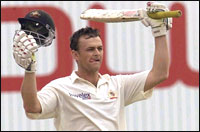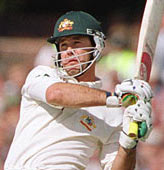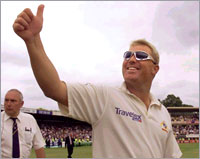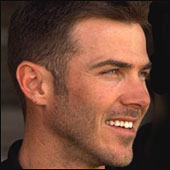The Australian captaincy: Who's next?
Daniel Laidlaw
It is said to be the most high-profile leadership position after that of
Prime Minister. The Australian cricket captaincy is a distinguished post
not conferred lightly. When one captain retires or receives the tap on the
shoulder, the selectors' next choice must be ratified by the board of
directors, as there is more than just cricketing ability to be determined.
There is national sporting image to consider, for an Australian cricket
captain seems to represent Australian sport more than any other single
sportsperson. The captain is also responsible for the sport's reputation
and must serve as an international ambassador, all factors to consider in
approving a candidate.
As Australia and most of the cricket world heads into season 2001/'02, it
is time to examine a list of aspirants who might eventually succeed incumbent
Steve Waugh. Although Waugh is not expected to retire until after the 2003
World Cup, grooming and identifying a successor is a long-term process
likely to be based on the leadership potential shown by the contenders in
the next couple of years. So as a new season looms, let's examine the
shortlist of four players vying to succeed Waugh.
Adam Gilchrist
 If the captain were being picked for Tests only, vice-captain Gilchrist
would be selected with barely a second thought. Personable, possessing
integrity and the team's premiere all-rounder, Gilchrist has an impeccable
image but more importantly the experience and skill to be a worthy
captain. The only problem is that the captain is not appointed for just Tests.
If the captain were being picked for Tests only, vice-captain Gilchrist
would be selected with barely a second thought. Personable, possessing
integrity and the team's premiere all-rounder, Gilchrist has an impeccable
image but more importantly the experience and skill to be a worthy
captain. The only problem is that the captain is not appointed for just Tests.
In an era of rotation policies where players are rested from one-day matches throughout the course of a season to preserve their mental and physical fitness, the captain is still expected to play every game. For Gilchrist
to lead that perception will have to change or Australia will have to revisit
its two-captains scenario, a divisive policy to be eschewed at all costs.
As wicketkeeper, opening batsman and captain in ODIs, Gilchrist would have
an enormously taxing role that no cricketer, even the remarkable
Gilchrist, seems capable of managing. If placed in that situation, there is the
legitimate possibility that either his batting or keeping skills may
diminish. Already an immensely valuable asset and arguably the team's MVP,
it is a risk the selectors can't afford to take.
Ricky Ponting
 The unpredictable career of Ricky Ponting took another upswing recently
when he was appointed captain of his native Tasmania in a clear indication he
wants to be, and is, still an Australian captaincy candidate. Ponting's
chequered off-field history and temperamental law-pushing displays on it
count against him more than anything else. There is no questioning his
pedigree as a cricketer - according to reports, his grandmother bought him
a t-shirt when he was young that read "inside this shirt is a future Test
cricketer" - but if the selectors were honest with themselves, they would
know that character is a concern.
The unpredictable career of Ricky Ponting took another upswing recently
when he was appointed captain of his native Tasmania in a clear indication he
wants to be, and is, still an Australian captaincy candidate. Ponting's
chequered off-field history and temperamental law-pushing displays on it
count against him more than anything else. There is no questioning his
pedigree as a cricketer - according to reports, his grandmother bought him
a t-shirt when he was young that read "inside this shirt is a future Test
cricketer" - but if the selectors were honest with themselves, they would
know that character is a concern.
The Tasmanian appointment is significant because even though Ponting will
hardly get an opportunity to lead his state, it proves he is still being
thought of as captaincy material. When Waugh has been absent through
injury Ponting has been the one elevated to vice-captain behind Gilchrist and he
is part of the team's leadership group. The fact that Ian Healy, upon his
retirement, chose Ponting to inherit the ritual singing of "Under the
Southern Cross" also should not be overlooked, because it means he must be
held in high esteem within the team.
Ponting has claimed that when on the field he imagines what he would do if
he were captain, so even though his actual captaincy experience is limited
he still has experience that cannot be discounted. How he handles himself-over the next two years, in all respects, is crucial to his chances.
Shane Warne
 Shane Warne was Waugh's main rival for the position when it was last
available two-and-half-years ago and he has long seemed likely to lead
only for yet another misdemeanour to hurt his aspirations. Warne has made no
secret of his ambition to captain but he no longer appears a viable
candidate, despite what the selectors may tell him. By 2003 Warne will be
33 and given that he is not likely to return for another Ashes tour in 2005,
appointing him captain would not be a progressive move.
Shane Warne was Waugh's main rival for the position when it was last
available two-and-half-years ago and he has long seemed likely to lead
only for yet another misdemeanour to hurt his aspirations. Warne has made no
secret of his ambition to captain but he no longer appears a viable
candidate, despite what the selectors may tell him. By 2003 Warne will be
33 and given that he is not likely to return for another Ashes tour in 2005,
appointing him captain would not be a progressive move.
It is one of those mysteries that superstars rarely make the best leaders.
Perhaps it is because they cannot force their teams to the kind of
perfection they are capable of reaching in their own deeds, and it
frustrates them when viewed as a personal failing. Whatever, Lara and
Tendulkar were replaced after captaincy stints and Warne, because of his
off-field scandals, is unlikely to get the opportunity to prove himself.
The final straw that seems to have terminated his chances was the phone sex
scandal in England a year ago. Upon returning home, Warne was stripped of
the vice-captaincy for the one-day series against South Africa and Ponting
appointed in his place.
Warne led the one-day team successfully in Waugh's absence for part of
Australia's home tri-nations tournament in '98/'99 and has a high-profile
supporter in Ian Chappel. At the time, the hostile way he reacted to
team-mates' mistakes raised some eyebrows. Warne also led the team as
stand-in skipper in Sri Lanka when Waugh was again injured in September
'99.
When he did, Waugh was so quick to rush back to the job that he was
prepared to risk serious injury, later saying he did not like the direction in
which he saw the team heading. It was hardly a ringing endorsement of his
deputy.
Damien Martyn
 Simon Katich has long been touted but his Western Australian team-mate is
actually the much more logical choice and is my personal pick for the job.
For one thing, Martyn commands a place in the team, and is a level-headed
and mature cricketer. He has served his time in the wilderness, far longer
than many are able to return from, and has been one of Australia's most
remarkable recent success stories. Yet strangely, he has not been
considered a contender, despite the credentials.
Simon Katich has long been touted but his Western Australian team-mate is
actually the much more logical choice and is my personal pick for the job.
For one thing, Martyn commands a place in the team, and is a level-headed
and mature cricketer. He has served his time in the wilderness, far longer
than many are able to return from, and has been one of Australia's most
remarkable recent success stories. Yet strangely, he has not been
considered a contender, despite the credentials.
It could be that Martyn does not aspire to such a pressure-filled job when
he is doing so well as simply a member of the team. There is also some
historical captaincy baggage. Awarded the Western Australian captaincy at
a young age, the responsibility became too much for Martyn and he gave it
up. The selectors would not want to compromise his talents by burdening him
with a post he does not seek so it would be understandable if Martyn were
overlooked, but as Australia's only other batsman apart from Ponting who
is younger than 30 and holds a firm place in the side, he is at least worthy
of consideration.
Whoever is eventually anointed, one thing is certain: he will be following
in the footsteps of one of Australia's greatest ever.
More Columns
Mail Daniel Laidlaw